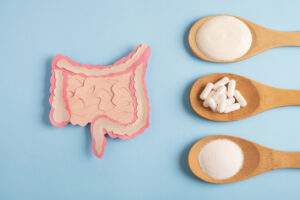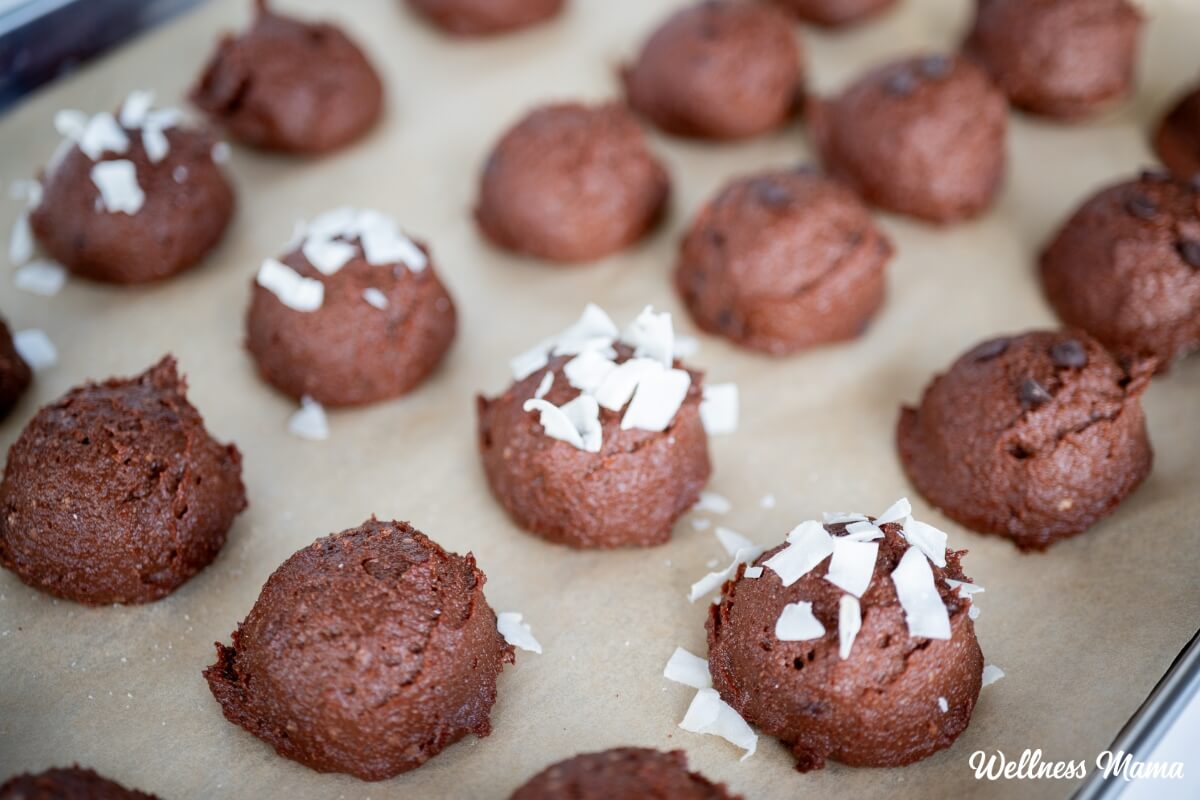Not sure which probiotics are right for you? The development of targeted probiotic strains is paving the way, but it can be really confusing
We need good bacteria to create a healthy microbiome in our gut, respiratory tract, skin and other areas.
‘Looking after your microbiome is crucial to overall health due to its extensive influence on various bodily functions and systems,’ says Megan Hilbert, Registered Dietitian specialising in gut health nutrition (topnutritioncoaching.com)
‘The microbiome consists of trillions of microorganisms, including bacteria, viruses, fungi and other microbes that inhabit different parts of our bodies, primarily the gut, and impact our health all throughout the body.‘
The microbiome consists of trillions of microorganisms
Many foods contain friendly bacteria – e.g.: live yoghurt, sauerkraut, kefir. Eating healthy amounts of fibrous foods (e.g.: vegetables, fruit, herbs, nuts, seeds, whole grains, beans, and pulses) is also important. If your microbiome is out of balance (e.g.: after taking antibiotics, from poor nutrition), probiotic supplements can help to repopulate and rebalance good bacteria. But, there are many different strains of probiotics and latest research shows that some are more beneficial for different issues than others. So, how do you know which probiotic strains are most beneficial?
Here’s our expert guide to the best probiotics for…
Gut Health
‘A balanced microbiome in the gut helps to break down food aids in the absorption of nutrients, along with producing ‘postbiotics’ which are molecules that have a positive impact on our health,’ says Hilbert.
‘Healthy postbiotics include nutrients such as vitamins B and K, amino acids and antimicrobial peptides that help to slow down the growth of harmful bacteria. Beneficial gut bacteria also produce short-chain fatty acids (SCFAs), such as butyrate, which have anti-inflammatory properties. These have been shown to help reduce the incidence of all kinds of chronic diseases including cardiovascular disease, high cholesterol, diabetes, irritable bowel syndrome (IBS) and other autoimmune diseases.
Prebiotics found in fibrous plant-based foods help feed the healthy microbes in the gut
There is also a link between the gut and the brain. These are in direct contact with each other via the enteric nervous system and gut microbes can influence neurotransmitters and metabolites that influence mood, anxiety, and cognition.” So, improving your gut health can also help to improve your mental health. In a recent meta-analysis of seven studies (BMJ Nutrition Prevention & Health, 2019) it was shown that consuming probiotic and prebiotic foods (to improve gut health) significantly reduced depression and anxiety.
Lactobacillus and bifidobacterium strains have been shown to help improve gut health along with a whole host of other conditions due to the gut’s influence on so many major areas of the body.
Probiotic foods such as live yoghurt, sauerkraut, kefir, kimchi, tempeh, kombucha, natto etc. contain these strains of beneficial microbes.
Prebiotics found in fibrous plant-based foods help feed the healthy microbes in the gut. E.g.: oats, garlic, bananas, asparagus, pears, onions, leeks, flaxseed, raspberries, and spinach all contain types of prebiotic fibre that feed, support, and help proliferate helpful strains of bacteria and other microorganisms in the gut.
You should notice improvements to the microbiome as early as a few weeks when introducing pre- and probiotics into your diet.
*Try: Healthspan Triple Action Biotic, £24.99 for 60 capsules – healthspan.co.uk
READ MORE: Got IBS? 18 tiny life changes Britain’s leading gut health expert says will help
SKIN HEALTH
“Skin problems are often related to gut and digestive issues,” says Hilbert. “Poor gut health also affects hormones which can lead to skin problems. By improving the balance of gut bacteria, this will lead to healthier skin.” To improve skin health, Hilbert recommends choosing probiotics that contain:
Lactobacillus rhamnosus GG – this strain helps reduce inflammation and improve skin barrier function and has also been shown to help with managing eczema and atopic dermatitis.
Lactobacillus casei supports the skin barrier by strengthening it and reducing the risk of infections and inflammation. This strain can also help support skin hydration and help those with dry skin.
Bifidobacterium breve – supports both skin hydration and skin barrier function. Some studies show this can help reduce the severity of atopic dermatitis and improve skin texture and appearance.
Try: Symprove Daily Essential Supplement (water based), £49.99 for 4 weeks supply (70ml daily shot) – contains 10 billion good bacteria. Available in Original, Strawberry and Raspberry, Mango and Passion Fruit – symprove.com
ORAL HEALTH
Latest research suggests that probiotics can have benefits for dental health. In a recent meta-analysis (Frontiers 2023) various studies have shown that probiotics (in the oral cavity) can significantly reduce abnormalities such as tooth decay, oral cavity fungus, infection, and swelling of the gums and palate. “Certain probiotic strains can inhibit the growth of cariogenic bacteria such as streptococcus mutans, which is a primary contributor to tooth decay,” says Cosmetic Dentist Dr Jasmin Piran (at smilesbyjasmine.com).
Gum Disease
“Probiotics can help reduce inflammation and the bacterial load in the mouth, aiding in the management of gum diseases like gingivitis and periodontitis,” says Dr Piran. “Certain probiotic species, including Bifidobacterium bifidum, Lactobacillus johnsonii, Lactobacillus crispatus, and Lactobacillus jensenii, produce hydrogen peroxide which has antibacterial effects. Hydrogen peroxide kills pathogenic bacteria by releasing oxygen which is harmful to the anaerobic (oxygen-hating) bacteria involved in the periodontal disease process. Hydrogen peroxide also helps to break down plaque which causes gum inflammation leading to gum disease if left untreated.”
READ MORE: What to eat for a healthy smile
Bad Breath
“Probiotics can help to balance the oral microbiome to reduce bad breath (halitosis),” says Dr Piran. “By promoting a healthy balance of oral bacteria, probiotics can decrease the presence of odour-causing bacteria, leading to fresher breath.”
Several probiotic strains have been identified as beneficial for oral health. “Using products that contain these specific strains can be effective in promoting oral health and preventing various oral health issues. Do chat to your dentist and they can advise on the best probiotics to help. These are available as chewable tablets, lozenges, chewing gum or mouthwash, which should remain in the mouth for more than just a few seconds in order to be effective.”
Lactobacillus reuteri. Reduces levels of Streptococcus mutans, a major contributor to dental caries. Helps manage gingivitis and periodontitis by reducing inflammation and harmful bacteria.
Lactobacillus rhamnosus. Inhibits the growth of pathogens associated with dental caries and periodontal disease. Promotes a healthy oral microbiome balance.
Lactobacillus salivarius. Reduces bad breath by decreasing the levels of odour-causing bacteria. Contributes to the overall health of the oral microbiome.
Streptococcus salivarius. Effective in reducing halitosis. Produces bacteriocins that inhibit the growth of harmful bacteria.
Bifidobacterium lactis. Supports gum health by reducing inflammation and pathogenic bacteria in the oral cavity.
Streptococcus oralis and Streptococcus uberis. Naturally occurring in the mouth, these strains help maintain a healthy balance of oral flora.
Try: SuperTeeth Dental Probiotic, specially formulated for the well-being of your oral microbiome. 60 caps, £26.99 at Healf.com
HEALTHY IMMUNE FUNCTION
Did you know that 70% of your immunity lies within the digestive tract? So, by maintaining a healthy microbiome this leads to an improved immune response and helps to protect against infection. “Research shows that the probiotic strain lactobacillus rhamnosus GG has been shown to enhance the body’s immune response by increasing the activity of natural killer cells and T lymphocytes, which are critical components of the immune system,” says Immunologist Dr Jenna Macciochi (drjennamacciochi.com). “Studies have demonstrated that lactobacillus rhamnosus GG can reduce the duration and severity of respiratory infections, highlighting its potential to bolster the immune defence against infections.”
Bifidobacterium infantis 35624 has been shown to help regulate the immune system, making it less likely to overreact to harmless substances, which can help to reduce the occurrence of allergies. “This strain works by promoting the production of regulatory T cells, which help maintain immune tolerance and prevent excessive inflammatory responses.”
Lactobacillus reuteri is another strain with promising effects. “Research suggests that lactobacillus reuteri can help mitigate the symptoms of autoimmune diseases like rheumatoid arthritis by modulating the gut microbiota and reducing systemic inflammation. This probiotic strain enhances the production of anti-inflammatory cytokines, which play a crucial role in managing autoimmune responses.”
*Try: The Naked Pharmacy Gut Love, pre and probiotic for gut health and over 19 billion, 19 strains of live bacteria, 60 capsules £21.00
URINARY AND VAGINAL HEALTH
Urinary Tract Infections (UTIs), which include cystitis, are caused by bad bacteria getting into the urinary tract and multiplying causing an infection. “UTIs are much more common in women,” says Consultant Gynaecologist, Dr Jo Bailey. “A woman’s natural anatomy makes it much more likely that you will get a UTI than a man. The most common bacteria causing UTIs is E. coli. The infective bacteria generally come from the gut via the bottom and the closeness of the urethra which is also much shorter than in men means that it is easier for the bacteria to reach the urinary tract.”
“Being sexually active tends to mean that you are more likely to get a UTI,” says Dr Bailey. “This is a consequence of several things. For example, some condoms can affect the delicate microbiome balance. Also, unprotected sex can alter your vaginal pH level. Your vagina has a pH that is slightly acidic to protect it from bad bacteria. Semen is the opposite and is highly alkaline, this means that the pH of your vagina might go up. This can lead to an imbalance in the vaginal microbiome that allows bad bacteria to travel to your urethra. The decrease in oestrogen during menopause can also lead to changes in the vagina and urinary tract. The lack of oestrogen can cause the lining of your urethra and your bladder to become thinner and produce less lubrication which may change your microbiome, so it becomes more susceptible to bad bacteria.”
Certain probiotic strains can inhibit the growth of bad bacteria commonly leading to UTIs. “Research shows there is a link between the vaginal microbiome and vaginal health,” says Dr Bailey. “The vagina contains an ecosystem of microbes (e.g.: bacteria, natural yeasts) that make up the vaginal microbiome. The good news is that, unlike the gut, the vaginal microbiome only needs a narrow range of microbes to keep it healthy.”
Research shows that the vaginal microbiome only needs three or four essential lactobacillus species to keep it healthy. These include lactobacillus crispatus, lactobacillus gasseri, lactobacillus jensenii and lactobacillus rhamnosus. These friendly bacterial strains help to maintain an ideal vaginal acidic pH and a range of anti-microbial compounds which protect the vagina from infection.
Try: VJJ Ultimate UT, £26 for one month’s supply. Contains a powerful combination of clinically researched strains of lactobacillus to help support the health of the vagina microbiome and alleviate symptoms. The formula also combines D-Mannose, a natural plant sugar. D-mannose is one of NICE’s self-care recommendations for women with recurrent UTIs. Research shows it can inhibit the bacteria that cause UTIs. Available – vjjhealth.com
Like this article? Sign up to our newsletter to get more articles like this delivered straight to your inbox.
Publisher: Source link






